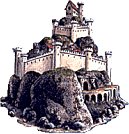 Books are an important part of
everyday life, at least for these days and times. But what would it be
like if certain books were banned just because of their content?
Books are an important part of
everyday life, at least for these days and times. But what would it be
like if certain books were banned just because of their content?
The Importance of Books
In association with The Name of the Rose By Umberto Eco
 Books are an important part of
everyday life, at least for these days and times. But what would it be
like if certain books were banned just because of their content?
Books are an important part of
everyday life, at least for these days and times. But what would it be
like if certain books were banned just because of their content?
That doesn't really seem like a reality nowadays, despite the discussions about removing certain books, such as The Adventures of Huckleberry Finn, from high school curriculum, we often pride ourselves of the availability of books, and other forms of information.
But what would it be like if we couldn't access the information we wanted? Once you're out of high school you can read The Adventures of Huckleberry Finn, and any number of other books without fear of repercussions, but that wasn't always so. In the middle ages, about the time of the Inquisition, many books were banned due to their heretical content.
![]()
In the book Name of the Rose, by Umberto Eco, William of Baskerville, and Adso of Melk arrive at a Dominican Abbey where a debate between the Franciscan and Dominican monks is supposed to take place. Unfortunately their arrival is preceded by the death of a young and bright man, one who practiced translating books into English. The books that would be translated would only be books that the Church and the monks of the Abbey deemed beneficial to the learning of its followers.
It is not long after their arrival that William determines that it is very unlikely that the man in question jumped, and it is more likely that he was pushed from the garbage chute to hide his murder, the only problem was, why would anyone murder a simple translator?
Of course the only reason possible was that he read something he wasn't supposed to, and if there was ever a place to be able to do such, then the Abbey was it. The Abbey was supposed to have an extremely large library, which no one could seem to find.
To make a long story short, this library was full of many books that had been banned by the Church, one of which had been written by Aristotle. It was called Poetics II, and it discussed the idea of laughter in debates, logic, and everyday life. Unfortunately the Dominican monks of the Abbey frowned upon laughter, viewing it as frivolous and useless, unlike the Franciscans, who believe that laughter is not only useful, but good for the soul.
Humans have what seems to be an innate need to protect things, even if it is something they despise. Which tells partly why the Dominican monks did no burn Aristotle's book, instead they did something much more deadly with it, they coated the pages with arsenic. I like to think of it as the "Humor Book of Death."
Unfortunately, because of this book, a rebel Dominican monk, a deformed man, and a young woman, whom Adso had a kind of crush on. The oldest of the Dominican monks, Jorge de Burgos, was definitely a radical, as many old people tend to be (no offense meant), and once William and Adso find the book, de Burgos goes so far as to begin eating it.
Along with Aristotle's missing book, there were thousands of others deemed full of heretical information, which was anything and everything that went against the views of the people in control.
To people who want absolute control, any bit of information is a threat to their control, new ideas can cause a revolt. There for all information, flowing in and out must be carefully controlled, kind of like what the media shows us.
One of the themes in this book, is definitely the role books, and other forms of information, play in the shaping of society, and I believe it does very well to get this point across.
